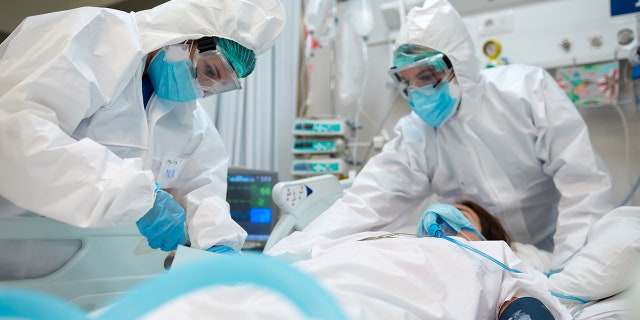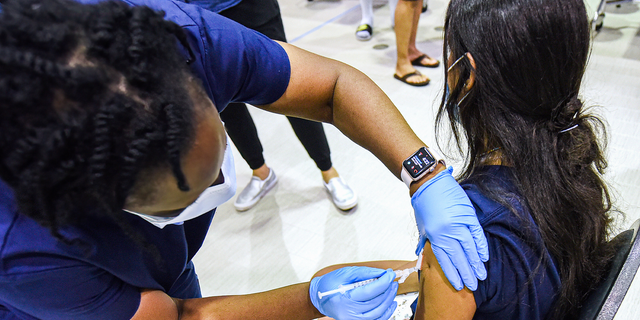British scientists have identified a version of a gene that may indicate an increased risk of lung failure as well as doubled risk of death from COVID-19.
Researchers at Oxford University announced their discovery Friday, saying it might explain why some people are more susceptible than others to severe illness from the virus. The discovery may also lead to development of more targeted treatments and medicine to combat the coronavirus.
SCHUMER SPOTTED MASKLESS DANCING IN PUERTO RICO AS HOUSE VOTED ON INFRASTRUCTURE PACKAGE
The research indicates that the lungs’ response to the virus is critical in how the body fights against it.

Hospital COVID Healthcare workers during an intubation procedure to a COVID patient
“The reason this has proved so difficult to work out, is that the previously identified genetic signal affects the ‘dark matter’ of the genome,” explained Jim Hughes, professor of gene regulation and co-lead on the study.
“We found that the increased risk is not because of a difference in gene coding for a protein, but because of a difference in the DNA that makes a switch to turn a gene on,” he said. “It’s much harder to detect the gene which is affected by this kind of indirect switch effect.”
NFL PUSHES BACK ON ONE AARON RODGERS CLAIM DURING RANT ON UNVACCINATED STATUS
Around 60% of people with South Asian ancestry carry the high-risk variant, the researchers said. The high prevalence might help explain the severe devastation seen in the Indian subcontinent.

A R.N. holds the hand of a COVID-19 patient in the Medical Intensive care unit (MICU) at St. Luke’s Boise Medical Center in Boise, Idaho on Tuesday, Aug. 31, 2021. More then half of the patients in the ICU are COVID-19 positive, none of which are vaccinated. (AP Photo/Kyle Green)
(AP Photo/Kyle Green)
Just about 15% of people with European ancestry carry the gene, and only 2% of people of Afro-Caribbean descent.
HOUSE REPUBLICANS MOVE TO STALL BIDEN’S VACCINE MANDATE
The team used an artificial intelligence algorithm to comb an immense database of genetic samples from hundreds of types of cells to isolate the action to cells that affect the lungs.

A nurse gives a girl a dose of the Pfizer vaccine at a COVID-19 vaccine clinic at Lyman High School in Longwood on the day before classes begin for the 2021-22 school year. (Photo by Paul Hennessy/SOPA Images/LightRocket via Getty Images)
(Paul Hennessy/SOPA Images/LightRocket via Getty Images)
“Surprisingly, as several other genes were suspected, the data showed that a relatively unstudied gene called LZTFL1 causes the effect,” said Dr. Damien Downes, who led the laboratory work from the Hughes research group.
The gene prevents cells lining airways and the lungs from responding properly to the virus, but it does not affect the immune system. This means that people who carry this gene should respond normally to vaccines.
CLICK HERE TO GET THE FOX NEWS APP
“Although we cannot change our genetics, our results show that the people with the higher-risk gene are likely to particularly benefit from vaccination,” said another researcher, James Davis. “Since the genetic signal affects the lung rather than the immune system it means that the increased risk should be cancelled out by the vaccine.”